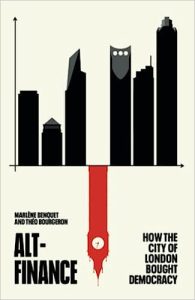In Alt-Finance: How the City of London Bought Democracy, Marlène Benquet and Théo Bourgeron trace the influence of a class of ultra-Eurosceptic financiers on the Brexit referendum. This concise and provocative book is a forceful statement of how business interests are shaping ideology, its thesis reaching far beyond Brexit, argues Joe Ganderson.
Alt-Finance: How the City of London Bought Democracy. Marlène Benquet and Théo Bourgeron. Pluto Press. 2022.
Find this book (affiliate link):![]()
 Ryanair’s Michael O’Leary and JD Wetherspoon’s Tim Martin were conspicuous figures during the Brexit referendum campaign. While practically every executive with significant British interests was keeping a low profile, the pair made the commercial case for their respective sides. Of course, in practice, British business was heavily invested in the referendum result and subsequent negotiations, perhaps nowhere more so than in financial services. Economically powerful but politically toxic after the 2008 crash, finance mobilised via the familiar ‘quiet politics’ of behind-the-scenes lobbying and donations, eschewing direct interventions. Given that the financialisation of the British economy had run in parallel with the UK’s EU membership, helping in turn to financialise other European economies, one would be forgiven for assuming financiers would line up to defend the status quo. Yet, in Alt-Finance, Marlène Benquet and Théo Bourgeron describe two distinct Cities of London and a sector deeply divided.
Ryanair’s Michael O’Leary and JD Wetherspoon’s Tim Martin were conspicuous figures during the Brexit referendum campaign. While practically every executive with significant British interests was keeping a low profile, the pair made the commercial case for their respective sides. Of course, in practice, British business was heavily invested in the referendum result and subsequent negotiations, perhaps nowhere more so than in financial services. Economically powerful but politically toxic after the 2008 crash, finance mobilised via the familiar ‘quiet politics’ of behind-the-scenes lobbying and donations, eschewing direct interventions. Given that the financialisation of the British economy had run in parallel with the UK’s EU membership, helping in turn to financialise other European economies, one would be forgiven for assuming financiers would line up to defend the status quo. Yet, in Alt-Finance, Marlène Benquet and Théo Bourgeron describe two distinct Cities of London and a sector deeply divided.
In the Remain corner is ‘first-wave finance’: large banks, insurance companies and institutional investors. These firms have boomed from investments in public stock markets, benefitting from London’s unique status as a global financial centre and its gateway into EU financial markets. Favouring Leave is ‘second-wave’ or ‘alt-finance’: hedge funds, private equity and other alternative investors who act on behalf of ultra-wealthy clients, frequently assuming corporate control of assets. Far from being a scattershot assemblage of financiers’ personal views, the authors argue the two wings are underpinned by distinct structural-material interests, and that their battle over Brexit forms part of a wider struggle between factions of capital for the soul of financialised democracies.
Making the case that business interests played an important and underacknowledged role in the so-called ‘People’s Revolt’
Combining brevity, big ideas and careful research, the book packs a lot into 176 pages. It starts by setting the scene in the run up to 2016, making the case that business interests played an important and underacknowledged role in the so-called ‘People’s Revolt’. The authors take issue with the popularly accepted notion that the Brexit referendum was decided by a backlash against globalisation. Instead, they argue it ‘pitted winners against winners’ (48).
The book then describes these belligerents, charting their origins from the growth of the first wave out of what Philip Augar called ‘the death of gentlemanly capitalism’ in the 1970s to the contemporary ‘insurgency’ (51) of the second wave. A thorough Brexit campaign accounting exercise reveals some surprising details, such as the fact that finance gave far more in direct campaign contributions to Leave campaigns than Remain. A special focus is then lent to profiling second-wavers, their identities, interventions and motives, which centre on a distaste for EU regulatory constraints (particularly around hedge funds) and a hyper-globalist, Singapore-on-Thames, vision of post-Brexit Britain.
A distaste for EU regulatory constraints (particularly around hedge funds) and a hyper-globalist, Singapore-on-Thames, vision of post-Brexit Britain
Benquet and Bourgeron then generalise, locating Brexit as one battle in a war between two modes of accumulation who associate with particular right-wing ideologies. In this figuring, Brexit was a victory by the forces of ‘authoritarian libertarianism’, shaking the incumbent ‘European neoliberalism’ and its variants across the financialised democratic world (with a focus on Brazil and the US as shadow cases). Money is translated into politico-intellectual heft primarily through a network of interlinked free market think tanks and expert groups such as ‘Economists for Free Trade’. While first-wave neoliberals are said to take a more balanced view about a role for the state – and, critically, for international organisations like the EU – maintaining a mixed-market settlement that has delivered steady returns, second-wavers aggressively seek to financialise all corners of public life, deploying Tufton Street outriders to blitz the public sphere on their behalf (103-115).
Authoritarian traits are then bolted onto these new libertarians, their attitudes towards mass democracy existing somewhere between ambivalence and open hostility, to the extent that it threatens their property and constrains their accumulative capacity. Finally, the factions are reapplied to the climate emergency, with multiple examples of Brexit-adjacent second-wavers such as Jacob Rees-Mogg and Nigel Lawson being associated either with denial or exploitation. The two waves now approximate, in Bruno Latour’s terms, to ‘modern’ and ‘out of this world’ (hors sol) outlooks: respectively, those placing faith in techno-scientific solutions, and those seeking to maximally loot the planet in preparation for its fall (126-127). The book concludes by depicting the kind of apex individualism usually reserved for sci-fi dystopia, with second-wavers ‘making the maxim ‘every man for himself’ into a universal doctrine’ (127), seeking to stymie or reverse any progressive environmentalism.
This book is breathless, covering vast ground in short order, which leads to some empirical oversights. For example, second-wave financiers are not the only business backers of Brexit and free market think tanks, yet there is a sense that their influence is all-encompassing. But do the Eurosceptic construction, fossil fuel and tobacco industries (104) really stand to benefit from market fanaticism, or are their deregulatory goals more prosaic, the operations of the Atlas Foundation ecosystem more varied? The policy agendas of these agents might have been reviewed more systematically; certainly a lengthier discussion of the intense intra-Brexit debates that followed the vote would have been welcome. Might these think tanks actually contain a mixture of neoliberal and libertarian, nationalist and internationalist outlooks for Brexit Britain? Might alt-financiers be simply motivated by quick bucks or narrow deregulation, not an encompassing ideology?
The [..] distinction, between (European) neoliberalism and authoritarian libertarianism, as two means to make elites money
This leads to the book’s key distinction, between (European) neoliberalism and authoritarian libertarianism, as two means to make elites money. The former is said to remain allied to a form of nominal liberal democracy while substantively draining its colour over several decades; the latter more impatient, increasingly hostile to even a democratic veneer. But who is in charge now, in this post-Brexit interregnum? And though the authors acknowledge their distinction is fuzzy and somewhat stylised at the margins, is it worthwhile at all? Liz Truss’s brief, disastrous reign and the consequent enduring scarring on Conservative polling suggests there are real constraints on the party’s free market proponents and think tank-aligned policymakers. Over 40 years, the British Social Attitudes survey has never identified more than 10% of the population in favour of both reducing taxes and spending. So while second-wave finance might plausibly have contributed to the Leave victory, Brexit (and the emancipatory promise it held for ‘Left Behind’ communities) leaves its agents far from politically liberated. In Britain, there is no public appetite for Singapore-on-Thames and to the extent that policy elites are perpetually caught between public opinion and economic elites, the vanishingly small Trussian tendency in Westminster suggests the public are currently winning out.
Perhaps rather than following Brexit with climate change, the authors might also have been better off exploring how socio-cultural politics can be weaponised to obfuscate political economy. The transnational cleavage is an established strand of theory, but there is a need for more research into the role so-called ‘woke-aligned’ (first-wave?) vs. ‘anti-woke-aligned’ (second-wave?) business elites are playing in stoking it, and to what end. Research of the kind devoted to the referendum might have illuminated legacies of Brexit, helping the authors differentiate their ‘authoritarian libertarianism’ from the better-established concept of ‘authoritarian neoliberalism’.
Alternative finance is increasingly reshaping our economy and influencing our politics
While posing these critiques, it’s important to keep sight of the book’s bottom line: alternative finance is increasingly reshaping our economy and influencing our politics. A distinction between a status quo neoliberalism that permits moderate progressive politics overseen by international governance and reactionary national libertarianism is sharpening into focus. This book arrives along with other urgent work on related themes by Brett Christophers and Quinn Slobodian. While there is a danger of overattributing Brexit to business elite influence, it is surely equally dangerous for social scientists to dive headlong into psephology without critically examining where the big money was flowing, who stood to benefit and what their endgame might be. Alt-Finance is an important corrective and should be read by anyone interested in contemporary British politics.
Note: This review gives the views of the author, and not the position of the LSE Review of Books blog, or of the London School of Economics and Political Science. The LSE RB blog may receive a small commission if you choose to make a purchase through the above Amazon affiliate link. This is entirely independent of the coverage of the book on LSE Review of Books.
Main Image Credit: Lubo Minar on Unsplash.







